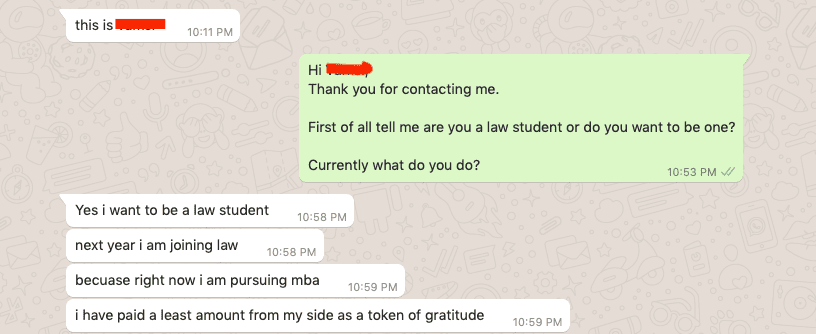
Studying law requires proper strategy and commitment. It is complicated and time-consuming. Yet, the journey to study law is very informative and exciting. You get to read about so many new things that you have only seen in movies or have heard from elders.
Doing good and becoming successful in the legal field requires elaborate thinking. Over time, you will have to develop the ability to think out of the box. You’ll have to make swift decisions.
One of you, let us say named V, contacted me on WhatsApp and asked, ‘How Should I Study Law?‘
Well, here is my reply. But before you read even five lines of this post, keep in mind that- “It is not about how much you know, but how fast you learn!”


Dear V,
First of all, thank you very much for supporting me and my website. It means a lot. Secondly, it is good that you want to study law.
Now, you wish to know how to start studying (and as you say, not as a law student but as a future lawyer.) Well, a male can not become a man without first being a child! But I understand what you are trying to say. I know you already are in MBA, and you can not start from the very very beginning.
Whether you start as a law student or skip and try to become a lawyer, the holy water of law is ‘Bare Acts.’ In the easiest words, I can say that Bare Acts, as the name says, are the raw, exact, on-point rules/laws.
Good lawyers interpret these laws and apply them in different cases.
Please understand that very, very few people know all the sections and articles of the Bare Acts. You might have seen in real life or movies that a lawyer’s chamber is filled with books. It is to take help from those books, depending on the case.
So do not force yourself to remember all these sections and articles. You will automatically remember important ones, and as time goes on, you will get better. They will be at your fingertips!
Most Important Bare Acts Are:
- Constitution of India
- Indian Penal Code
- Civil Procedure Code
- Criminal Procedure Code
- Indian Evidence Act
- Family Law
There are many acts. But the above ones are the most important and extremely useful.
Other Essential Bare Acts Are:
- Indian Contract Act
- Transfer of Property Act
- Sale of Goods Act
- Specific Relief Act
- Indian Partnership Act
You need time to read these. The first five laws are vast. I have all these acts systematically on this website. You can learn from there, or you can buy books for them. I have a list of recommended books for these subjects. Now, since you want to focus more on being a good lawyer, this is pretty much it. But this is NOT EVERYTHING.
Learn Law from Internship
Very frankly speaking, the main thing that you need to know to be a good lawyer is not in any of the books. It is in an actual court.
You will have to learn a lot of things like Drafting, Pleading, Framing Applications, etc. You can learn these ONLY if you do an internship under a lawyer in an actual court.
But keep this in mind too, that without those bare acts, it will be very tough, and if you do not read them, you will be clueless in court when you intern under any lawyer. If you do not know the law, and if you work as an intern, you might not be treated very well. You will have to make photocopies and bring tea for months before the lawyer under whom you intern starts valuing you. (Also, even if you are very well-read in law still if you intern, you will have to do these small works.)
Now, you said you are reading articles and watching law videos. EXCELLENT! Keep doing that. BUT DO NOT FORGET TO READ NEWS AND ESPECIALLY LAW NEWS. Apps like BAR AND BENCH and LIVE LAW will help you a lot. They have all the new law news. (I also wish to have apps like these one day.)
Learn Proper Drafting
Drafting is an essential part of being a good lawyer. Drafting is writing what your client will say in a proper, legal way. A good draft, at times, is capable of making or breaking a case. You will learn these in an actual court, but you can learn the basics of drafting in books. A lawyer can also earn good money even if he just knows how to draft well.
Be Confident and Make Connections
Apart from this, to be a good lawyer, you need to have good connections (with fellow lawyers and all sorts of people who can get things done like Police, etc. But these are things that you have to think about after 3-4 years. Not now.)
You also need to be very frank. Be confident, even if you are wrong. This is against the professional ethics of an advocate, but this is what happens in practical life. Never feel ashamed in court. Talk to everyone and anyone you can. Make a habit of greeting senior advocates when you see them. This is not buttering someone but just being social and respectful.
It is said that after a student completes law, it takes him at least five years to establish a practice of his own; assuming his father, brother, or family members are not advocates. Being established as a lawyer is hard and requires time.
8 Best Ways to Study Law and Remember It
1. Make a daily habit of reading Bare Acts. This is very important.
2. If you do not understand something, read it ten times. I bet you will start understanding.
Here, it will seem that I am pitching an ad for my website, but honestly, I am not. I will request you to read from my site because Bare Acts on my website have internal links. You won’t find this on any other law website (that I have seen), and this feature is not in books either.
What this is that-
Bare acts on WritingLaw have internal links to save you time.
For Example-
Section 174A of the Indian Penal Code has a mention of Section 82 of the Criminal Procedure Code. Now, many students, especially new law students like you while reading this section of IPC, will not know or remember what Section 82 of CrPC is. It will take time to find that section in a different bare act. It will take time to Google search and all that. What I have done is that I have given links for these sections right there. Clicking on it will instantly take you to that section in a new browser tab. So it will be easy to study.
3. Be updated on new law news and judgments. Download at least one app that I said above (Live Law or Bar and Bench)
4. Keep reading Law Notes, Articles, and keep watching YouTube videos. (Video will be better for now than reading. First, you need to develop an interest. Watching videos will build interest in you.)
5. See if you can work/intern under any lawyer. Keep this option open, and the moment you join law college/class, start working/interning under a lawyer. (You will learn most of the things here.)
6. Write at least two paragraphs every week. No need to write big ones. Just small, basic articles. Start with any topic.
Make yourself think. Make yourself believe harder. Question your thoughts and also answer them. Argue with yourself. (Believe me, it will be amazing and helpful.) Now, write these on a copy, but if you have a laptop or computer, then please use that. It will improve your typing and help during drafting.
7. Argue/Debate with friends on any topic. It does not always have to be law. As the law is interconnected or linked with almost all fields. So there is nothing like a “law boundary” you have to be in. Just debate. Argue (in a positive sense.) It will increase your quick thinking skills and make you come up with faster, responsive replies.
8. Share whatever exciting things you read in law/bare acts with your friends orally. If you discuss it verbally, you will never forget it.
- Article 334A of the Constitution of India - 14th April 2024
- Article 332A of the Constitution of India - 14th April 2024
- Article 330A of the Constitution of India - 14th April 2024








Hi Ankur,
I hope you are doing good, I want to thank you for all the hard work you do so that lost people like me can save their time and put all their time and energy in studying law. secondly, I’ve read this article a few weeks ago and started following it step by step and have seen the improvement in myself too adding more reasons to be more thankful to you.
all your notes and articles are so precise and well structured, this world needs more people like you.
Hi Samiksha,
Thank you very much for your nice, kind, detailed words. It gives me please to know that it is helpful to you.
Please, write a blog as above for those students who are preparing for judicial exam. The above article is very useful for the students of law. If you give us proper guidance for judicial exam it will be better for us. Thank you.
Sure. Please see this: How to Study for Judiciary Exam
useful information
Happy you find it worthy.
Really needful , absolutely correct
Thinks easier once you read thoroughly.
Happy you liked it. 😊
nice blog thanks for sharing..!
Glad you liked it. I will work harder to improve even further.